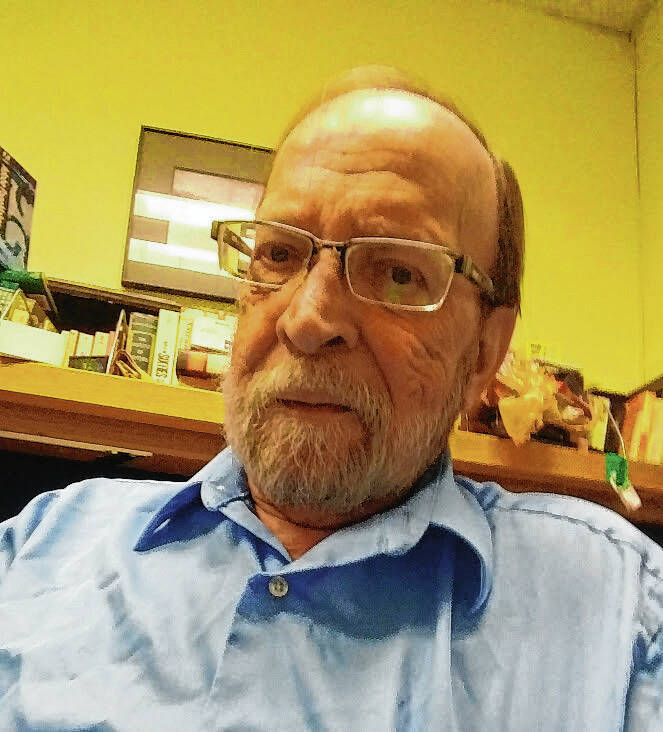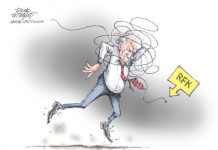I have always been proud to be a Hoosier, proclaiming it boldly even to coastal snobs who almost think of it as a confession of mental deficiency.
I was not born in Indiana, but I was raised enough here to have adopted its values as my own – hard work, thrift, loyalty, integrity. Consider me a backward rube if you must, but I wear this state’s nickname as a badge of honor.
But it turns out I may have been a little reckless in my enthusiasm, because “Hoosier” is not official. It has never been formally adopted by the state legislature, which as we know is a prerequisite for acknowledgement in polite society. Just ask supporters of the mastodon, our approved state fossil, and the lovely Say’s firefly, our sanctioned state insect.
So, “Hoosier” is just a rogue phrase, which should be whispered instead of shouted lest the nickname police hunt us down and shame us like the sobriquet-spewing dogs we are.
Happily, the General Assembly is coming to the rescue. After ignoring the issue all the way from its 1816 inception, that venerable body is finally considering a resolution to make “the Hoosier State” Indiana’s official nickname. We can all come out of the shadows and never have to deny our true nature again.
Of course, the legislator behind the resolution – Republican Rep. J.D. Prescott of Union City – is going a tad too far, as legislators tend to do. He wants not only to ensconce the name but formalize an origin story as the accepted version of how the name came to be.
And that is just so wrong.
You’ve heard some of the Hoosier legends.
It goes back to “hoozer,” a dialect term from England that meant anything large, like a hill. It evolved from a greeting a visitor heard when knocking on a cabin door in Indiana, “Who’s yere?” Indiana’s early settlers were such violent fighters that whenever a barkeeper saw a stray ear on the floor, he asked, “Whose ear?”
The version Prescott wants to immortalize is the one about “Harry Hoosier” an itinerant Methodist minister who, though, illiterate, preached with such passion that his congregants became ardent followers and gladly took the name “Hoosiers” in his honor.
I’m not saying this story is impossible, just improbable. For one thing, his name may actually have been “Hozier.” For another, he was well-known throughout the country, and his preaching took him to several states – why did his name stick in this particular one? Also, there was another fellow, name of Sam Hoosier, who was hired to build a canal in the 1820s, a decade before the nickname took hold.
But advocating the improbable with sincere conviction is what lawmakers do, and the closer something gets to highly improbable, the closer they get to absolute certainty. So perhaps we will be stuck with the story of Harry Hoosier.
The problem with that is not that it would be wrong. It’s that it would be forever accepted as reality, correct or not, and that would destroy the mystery our nickname has always had.
Let’s face it. Indiana is a mid-size state of no particular distinction in the middle of the country, no prefect weather, no outstanding geographical features, no historic milestones of epic proportions. All we have is the reputation we build from the present on.
And the mythological allure we can preserve from the past, which is what our nickname does.
No other nickname can match ours. The Buckeye State and Bluegrass State? How prosaic. The Show Me State? Too corny by half. The Empire State and Golden State? Gaudy and pretentious.
Only the Hoosier State has a nickname that remains elusively, tantalizingly mystical and enigmatic. Replace the perplexity with certainty, and the magic will be gone.
In other staggering news of legislative significance, the General Assembly will consider a measure to make the breaded tenderloin our official state sandwich, so put down that baloney on white with mayonnaise and promise to sin no more.
And from this day forward, pi will be 3.2, so go square all those circles.
Leo Morris, columnist for Indiana Policy Review, is winner of the Hoosier State Press Association’s award for best editorial writer. Morris, as opinion editor of the Fort Wayne News-Sentinel, was named a finalist in editorial writing by the Pulitzer Prize committee. Contact him at [email protected]. Send comments to [email protected].Reach





